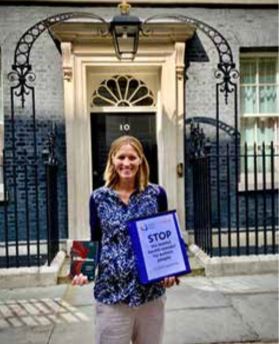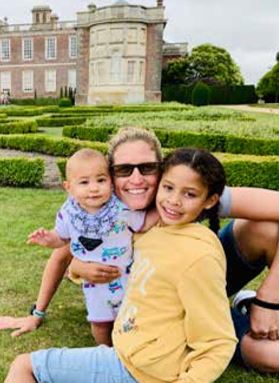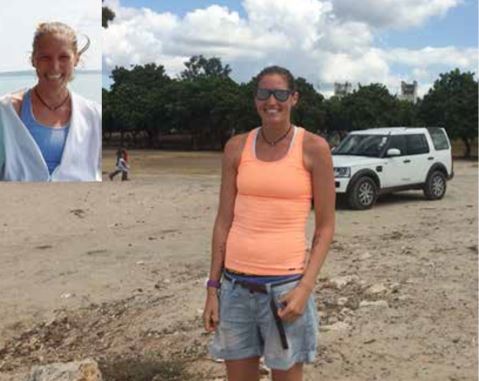
Alexis Quinn is an autistic woman who escaped the British mental health system. This is no metaphor: she literally escaped.
On a sunny Monday morning in May 2016, Quinn walked from the garden of the mental health facility where she was detained, picked up the bag of clothes she had previously hidden by the bins, and climbed into the car of two friends who drove her straight to Dover. From Dover they went to Paris where she caught a flight to Dubai then a further flight to Lagos in Nigeria. Once in Nigeria, Quinn set about rebuilding her life, far out of the reach of the UK’s Mental Health Act. Quinn has written a book, Unbroken, about her experiences and, when we spoke recently, was happy to tell me what happened in detail.
Things first went wrong for Quinn as a young adult when her brother died unexpectedly. This highly distressing event happened around the same time as her daughter was born. As if that was not enough, Quinn had also changed jobs and returned to the UK after living in Asia.
“It was far too much change for somebody who was autistic,” she reflects. In order to cope, she turned to her usual strategies – lots of physical exercise, especially swimming (in her youth she was on the English team) and focusing intensely on her special interests.
The problem was that after her brother died, Quinn became extremely interested in death. Initially, she researched how the body decays after death but then she moved on to subjects such as the most painless method of suicide. She could not understand why her focus and passion, which had always won her praise in the past, was now causing “deep worry and deep scrutiny”.
Asking for help: a major mistake
She decided to go to her GP for help: “And that was the biggest mistake of my life.”
Quinn says that she could have used some help – “maybe £5,000 worth of psychology, some occupational therapy, some speech and language therapy”. Instead, she went into an inpatient unit. “As soon as the door closed, everything was so overwhelming. My routine was gone, my familiarity was gone. I wanted to leave. They said no.”
This was the beginning of three and a half years in 12 different hospitals and institutions, which Quinn estimates cost the NHS about £2.5 million: “All that money wasted on traumatising me and trying to fix something that a) isn’t broken and b) can’t be treated.”
Quinn tried to free herself from entanglement in what she calls the “Velcro system”. She became calmly and rationally convinced that, as she was autistic, it was the environments in each of these noisy, chaotic and scary institutions that were causing her challenging behaviour and autistic meltdowns.
She entered “a trauma cycle” – overload, meltdown, restraint, forced druggings, seclusion and long-term segregation, then overload again.
In her book, Quinn graphically describes how any action on her part that was perceived as non-compliant or aggressive would cause noisy alarms to be set off and six or more staff members gathering to prepare to restrain her.
As an autistic person, the chaos and sensory overload was the exact opposite of what she really needed. Feeling that the endless trauma cycle meant she would never leave, she finally took matters into her own hands.
Lagos magic
In Lagos, she stayed with a friend until she could find herself a home and a job and her parents could bring her young daughter out to join her (which they did six weeks later).
As soon as she arrived in Lagos, she felt better “as if by magic. Except it wasn’t magic at all. It was common sense.” She created her own personalised care plan to meet her needs using routine and structure. The trauma, needless interventions and detention ended. Reflecting on the treatment of those with autism and/or learning disabilities, she says we all need “to stop confusing trauma and difference for madness”.
In a recently published open letter to the Care Quality Commission (CQC), Quinn castigates the organisation for “bollox reporting” including promoting the “dangerous lie” that the system is committed to community-based psychiatric care.
Instead, she wrote, “these hospitals exist and house people against all government guidance, human rights law and medical recommendations. They unnecessarily restrain, forcibly medicate and deprive people of their most basic liberties all the time and not only in ‘extreme’ cases.”
Quinn suggests that the CQC views the scandals at Winterbourne View, Whorlton Hall and Yew Trees hospital as rarities when they are simply examples of a prison-like system: “I don’t think the CQC are turning a blind eye – they just don’t know what to look for.”
However, she says they are improving: “Just this month the CQC have reported ‘Inadequate’ ratings rising from 5% to 22% for independent autism and learning disability services. This is great news.”
Quinn has done a lot of work for the CQC on their expert advisory panels, but she continues to challenge them: “I am not going to sit there and say it is all fine. It’s not fine. I am happy to be a conscience.”
Silence on subtle abuse

She tells me that, while the world is often shocked by examples of more extreme abuse such as people being assaulted, low-key abuse can be just as damaging.
“The subtle words dripped in ears. And that stuff doesn’t get seen,” she recalls. She adds that her crucial, calming half-hour of outdoor leave could be taken away by staff saying: “I can’t be bothered to go out for a walk today, you are not having your half-hour.”
She says: “Just being in hospital is torture. The closed doors deny our right to express ourselves and remove our right to a family life. “The system is abusive. If we need help, it should be in single-occupancy crisis housing that is homely and tailored to our specific needs.”
On top of all this is the amount of medication used: “All the drugs that you are forced to take – I was on 14 tablets a day. That is abuse.”
Quinn was expected to practise everyday living activities such as washing and folding clothes, which she found difficult. It went further: “We have to pretend to be neurotypical to earn rewards like going outside. We have to pretend to be something that we are not. These systems are draconian and have no place in our society.”
She does think that there is a growing swell of opinion against the use of restrictive practice and behaviourist methods of control.
“Back then, it wasn’t seen as a human rights violation. I was saying this stuff and people were laughing. Things are changing very slowly but, first of all, people’s mindsets have to change.”
She is very aware, however, that nearly a decade after the Winterbourne View scandal, thousands of people are still stuck in the system.
Stuck in one story
Quinn was inspired by a talk given by Chimamanda Ngozi Adichie (the Nigerian author of Half Of A Yellow Sun) about the danger of “a single story”. Adichie said that if you show a person as simply one thing over and over again, that is what they become.
For Quinn, this helped to explain how the continually repeated “story” that she was mentally ill had prevented her from understanding sooner that she was simply an autistic person in a completely unsuitable environment.

Quinn is writing a second book, this time about autism and pregnancy. She tells me that when she googled “autism and pregnancy”, nothing came up.
“Autistic women have no role models for pregnancy. I think it’s really sad. When I had my daughter, I didn’t know what to expect,” she says.
With her second child, Quinn hired a solicitor to fight for reasonable adjustments during childbirth. Quinn wants autistic women to know the options that are available and that they have a right to family life. “It is totally fine that we procreate,” she says.
When she was pregnant with her son, she joined an online parent forum. The experience showed how much parents feared having a child with autism.
She says: “Parents are petrified that their children might have autism. But, you know, each of us have a life worth living. We are human too! Let’s stop marginalising difference.”
She now believes that people with autism need a Pride movement of their own: “What I mean is that we accept ourselves for who we are, and we are proud of ourselves, and we are proud of the way we socialise autistically, we are proud of the way we communicate, and we are proud enough to advocate for ourselves and not hide away.”
Quinn says that she does understand that autism can be difficult “but it is difficult because what we value in society and the way we organise our environment makes it difficult. The environment I was forced to live in nearly killed me – more than once.”
So, Quinn has now settled happily overseas. She feels lucky to have got out of the system and is working to help make changes happen so others do not remain trapped. She has a good job and can afford support staff to take care of the things she struggles with.
“I still can’t fold up clothes, cook dinner or clean. I can put on a nappy but I still can’t fold up clothes. And that’s fine,” she laughs. “I’ll survive.”
● Alexis Quinn’s open letter to CQC is on the Rightful Lives blog at https://tinyurl. com/y29mgocj
● Unbroken: Learning to Live Beyond Diagnosis is published by Trigger Publishing (2018)




